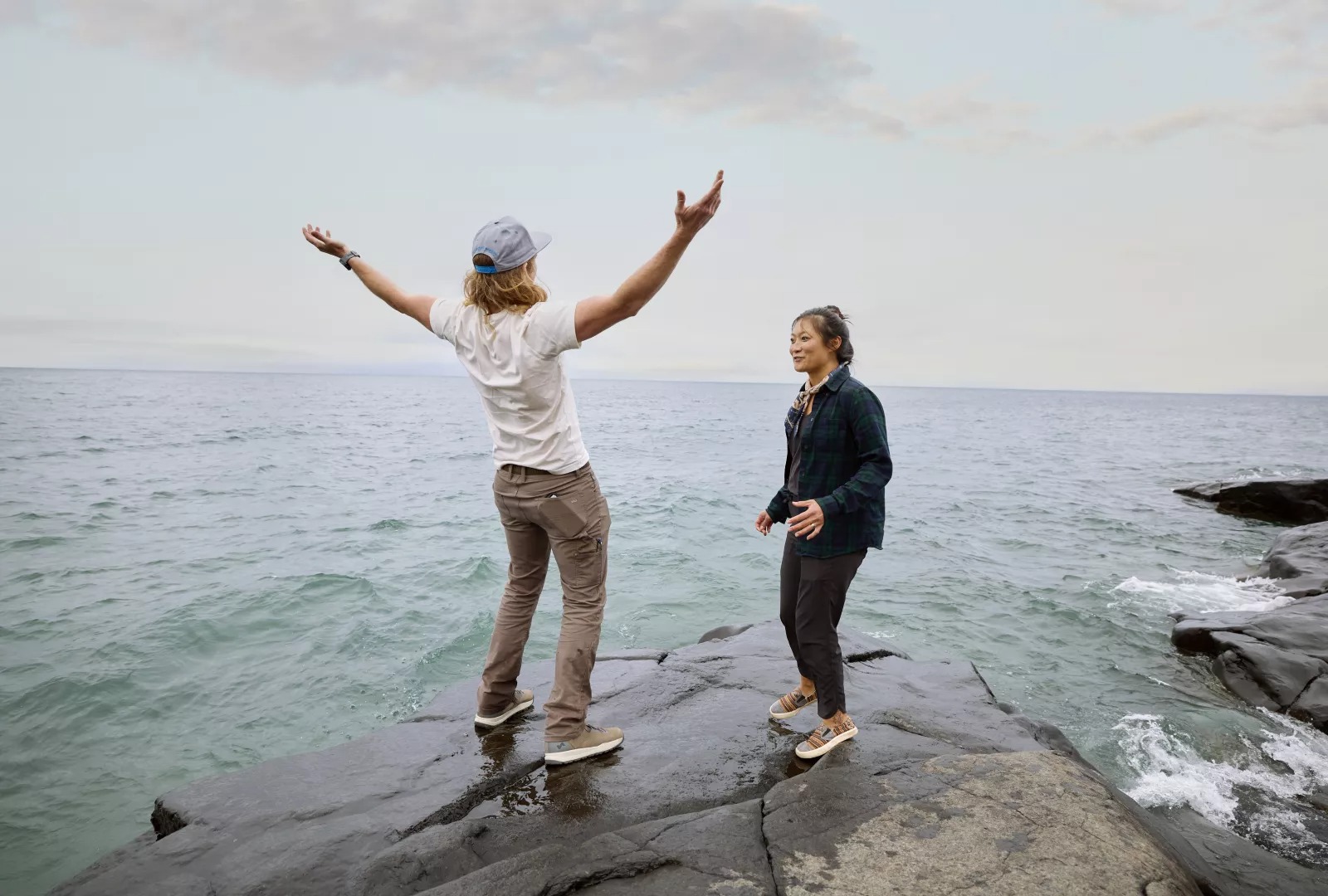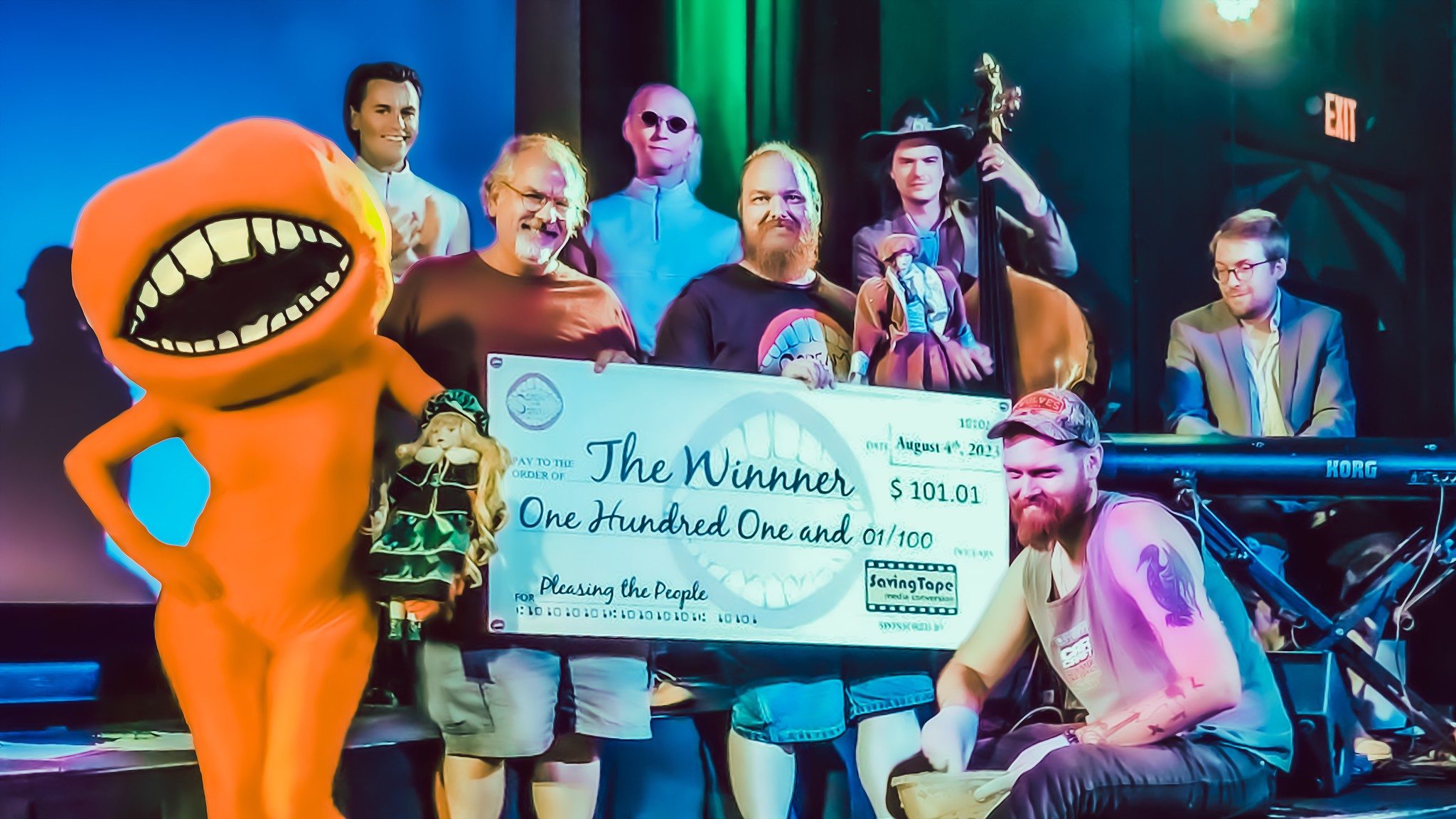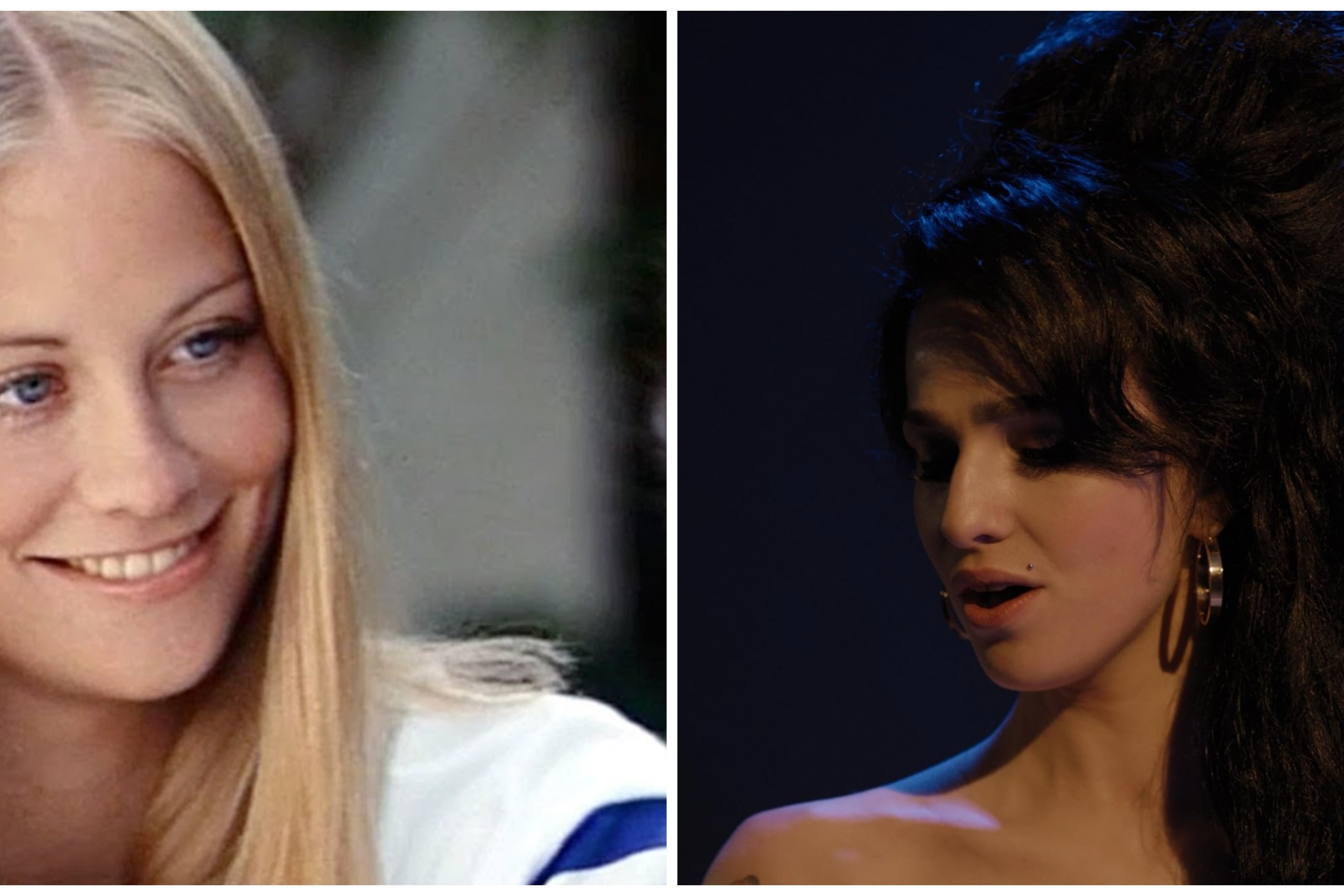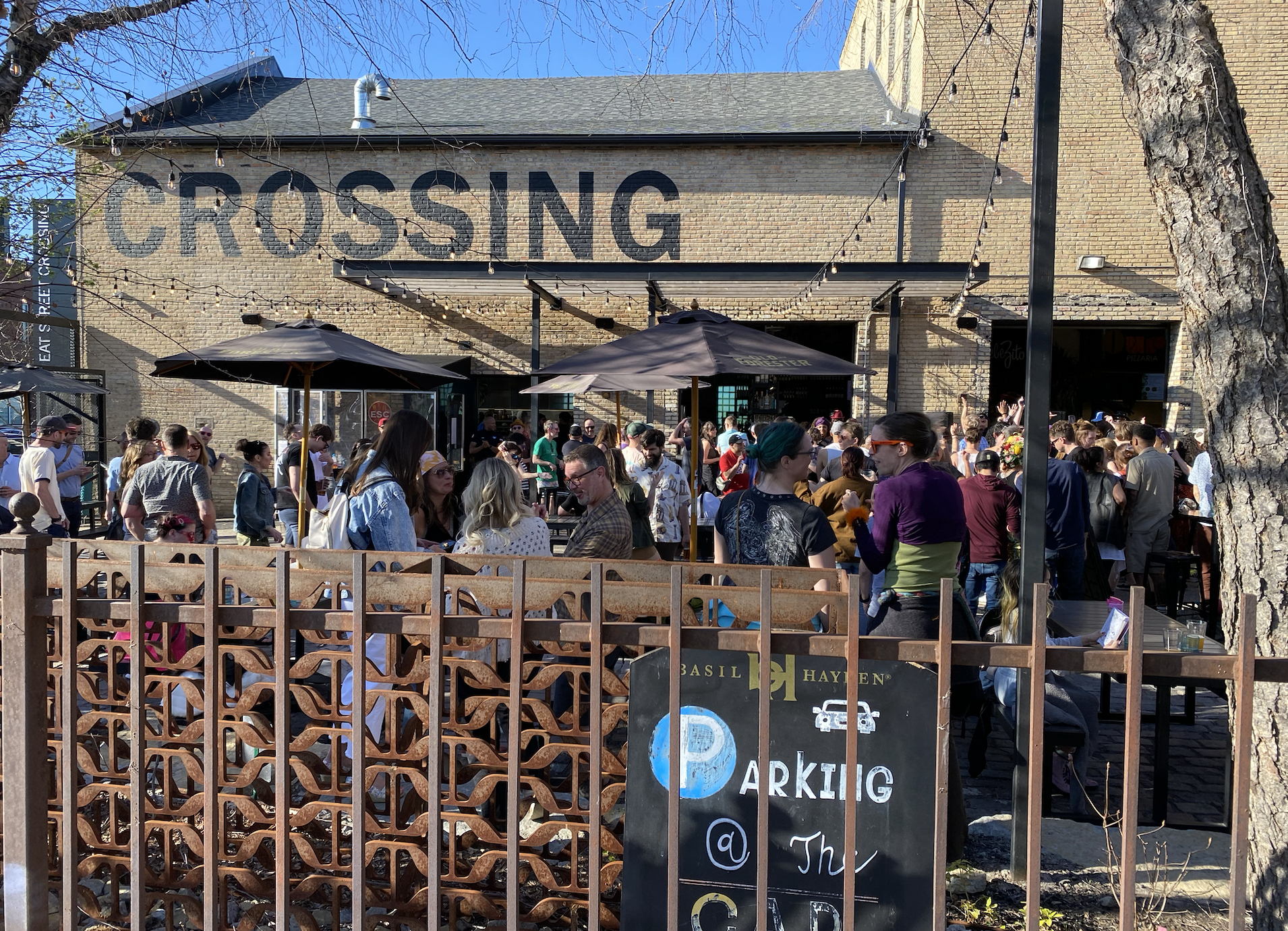A few hundred students have gathered at Northrop Mall on the University of Minnesota campus—not an immense turnout, but respectable for a gray and drizzly Monday afternoon. They’ve just marched the short distance from Coffman Memorial Union, conducted in an orderly fashion by a number of marshals in yellow fluorescent vests, and now those protesters who plan on spending the night here are assembling their tents.
There are few signs held aloft, but mostly there are flags. Palestinian flags abound, as you’d expect, and there’s one red flag for the Popular Front for the Liberation of Palestine, as well as a small group of counter-protestors hoisting Israeli flags. (“Don’t even look at them,” protesters are instructed from the stage.)
The events driving today’s march and rally are headline news, and despite bad-faith distractions amplified through media coverage, the protesters are crystal clear about why they’re here. Over the past six months, the United States has contributed billions of dollars to Israel’s war on Gaza, resulting in more than 34,000 Palestinian deaths, most of them women and children, and the “utter annihilation” of homes, hospitals, schools, and infrastructure. Israel’s death toll, meanwhile, stands at around 1,700 people, most of them victims of Hamas’s October 7 massacre. Another 77,000+ Palestinians have suffered injuries, and a severe lack of clean water and food has led to rampant sickness.
Last month, President Joe Biden warned that the Israel Defense Forces invading Rafah—the southernmost point of Gaza where half of the 2.3 million population has fled—would be a “red line,” though increasingly “extreme” right-wing Israeli Prime Minister Benjamin Netanyahu keeps creeping toward it. Aid organizations fear that such an invasion would create an “absolutely catastrophic” “bloodbath” for Palestinian civilians.
Back on the mall, speakers intermittently lead the crowd through a series of chants. There’s “From the river to the sea/Palestine will be free,” of course, mixed in with a little “Free/Free/Free Palestine.” The names attached to the hearty cry of “You can’t hide/We charge you with genocide” include Biden, Netanyahu, and Ettinger.
That would be Jeff Ettinger, the former Hormel CEO and failed congressional candidate who serves as the U’s interim president. And beyond the general call of “Free Palestine,” the protestors have more specific demands from him and the university.
The encampment first went up on April 23, and the administration’s immediate response was clumsy. Campus police arrested nine people, six of them students; with that, the peaceful protest became major news. The U has since been slightly more hands off, but coinciding with Monday's 2 p.m. rally, the administration locked doors on a number of campus buildings in the area, sparking concerns that there might be an additional police response.
That wasn’t the case, and beyond presumably inconveniencing some students and faculty, it’s hard to see what the response accomplished. (One student told us he hadn’t planned to attend the encampment, but he was locked out so he couldn’t work.) The buildings remained locked Tuesday, as similar protests at New York City's Columbia University and UCLA were swarmed by police; student-led U of M protest groups are set to meet Wednesday morning with Ettinger to discuss their demands.
Racket attended Monday’s protests because we wanted to hear from the students themselves. Many students at the protest politely declined to talk to us, which is understandable given the often condescending media coverage fellow protesters have received around the country. And so, in addition to rallying students, we spoke with other protesters by phone about how the bloodshed in Gaza has mobilized students for some of the widest demonstrations on campus in recent memory.
In their own words, here's why they're out there.
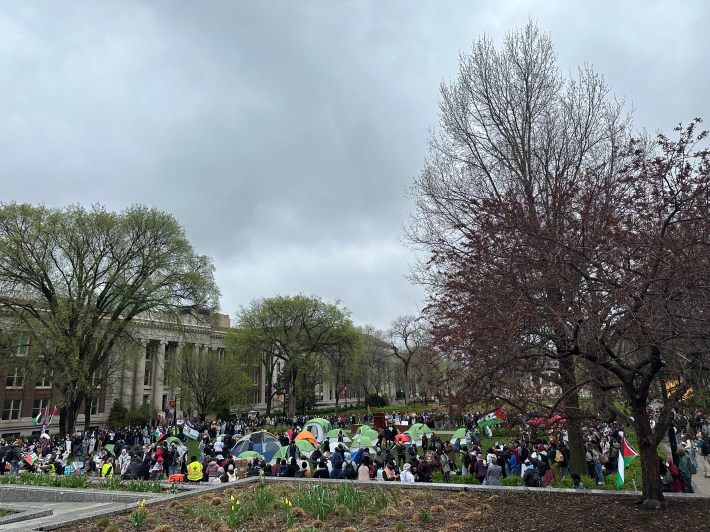
Imogen Page, U of M graduate student and member of Jewish Voice for Peace Twin Cities
I'm getting a masters of social work, so I'm being trained to treat trauma. And I can't stand by while the university is investing my tuition dollars in Israel and in weapons manufacturers that are creating all this trauma. Bombing families, homes, hospitals, and schools. That's why I'm out there.
In my experience the encampments have been really warm, convivial. Everyone is staying really focused on why we're out there: There's a genocide in Gaza, and we're demanding that our university stop funding it. There are students from all kinds of backgrounds—undergrads, graduates, faculty, staff, community—who have been coming out, helping each other set up tents, serving each other food, making sure we all have what we need to be as comfortable as we can out there in the rain. Last Tuesday we had a Passover Seder at the protest with the campus community, and it was really special and beautiful.
Antisemitism is a really serious issue, and we need to be very clear that criticism of Israel and anti-Zionism is not antisemitism. And that's because Zionism is not the same as Judaism. I'm one of many Jewish students who are showing up to these protests, and we're not showing up in spite of being Jewish—we're showing up because calling for an end to genocide is in line with our Jewish values. I think that a lot of politicians and right-wing organizations have a really big stake in weaponizing Jewish trauma so it continues to support the war machine. I think there's a conversation to be had about the political power of Christian Zionism in this country, too. But primarily, I think there have been generations of propaganda telling Jews that the only way for them to be safe is to have a militarized Zionist ethnostate. And so, you know, a lot of Jewish students are standing up and say, actually no, our liberation is tied up with everybody else's.
I'm going to keep showing up. I am really honored to be following the leadership of Palestinian organizers in this moment. It feels like exactly the right place to be as a Jew during Passover.
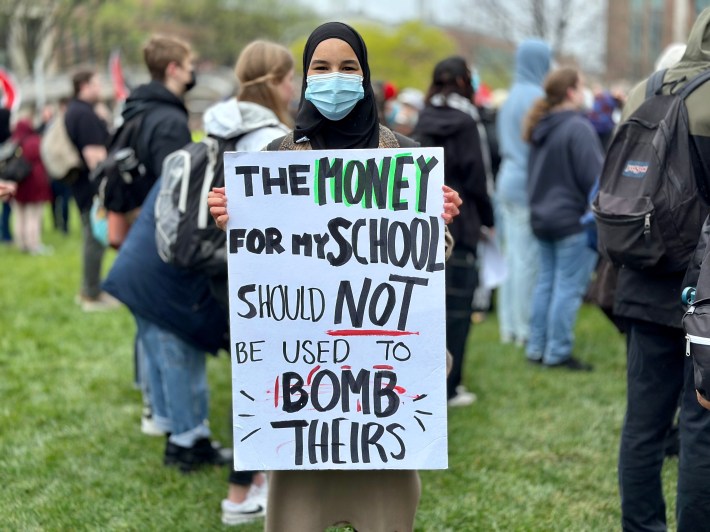
Rabeah, Mechanical Engineering Major at the U
I’m here because I’m human, and I really cannot stand and watch literally every single day on my screen the conflict—the genocide—getting worse and worse. I see them as people, as human, and I can’t stand and not do anything about it. I’m here to stand up and give them a voice when they can’t speak out.
I’m really not happy with the university’s response. I saw a post about liberal universities talking and teaching classes about student protests on campus in the past, and it’s all flowers and rainbows—”look how great they were when they were doing it.” As soon as we have student protests on campus, we’re bad, and breaking the law, and they’re shutting it down before we can even get anything started. I think it’s really disappointing and I want to see change.
I feel like people try to make it more complicated than it is. It’s really just about letting people live and giving people equal rights. It’s not about all these politics and complications at the end of the day. It’s giving children the right to education and letting children grow up with their parents, keeping families together. People complicate it more than it needs to be.
It’s really an amazing feeling [to see students rallying together]. We’ve been seeing these horrible atrocities on our screens for the past couple of months, and you always want something to happen. You’re always like, “Why is nobody doing anything?” I feel like this is the action that we’ve been needing for a long time. It makes me feel really excited for what’s next.
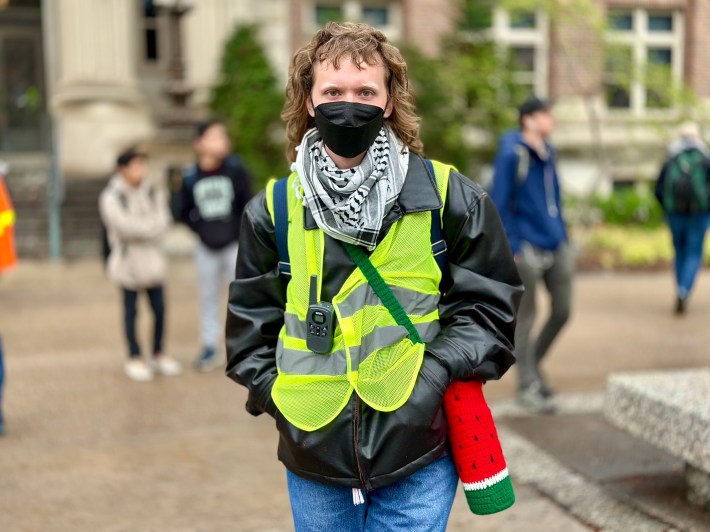
Ty, Protest Marshal, Member of U of M Students for a Democratic Society, and MCTC Student
We are out here to demand that the U of M divest from Israel, divest from the weapon companies that are supplying weapons to Israel, and demand that they are all banned from [recruiting on] campus.
We have heard virtually nothing from admin until today, when we got an email that we would get a 30-minute meeting with Jeff Ettinger and I think another admin. Besides that we have heard nothing. And we’ve had cops called on us—a lot of repression from the U. But if anything, it’s lighting a fire under peoples’ asses to come out here and support.
In terms of getting the word out, we’re posting, we’re flyering, just trying to get the message to anybody that we can, to try and get more and more people out here. And I would say that overall the response has been pretty good. Obviously we have a big crowd out today, even though it’s really cold.
With the genocide and everything that’s happening right now, it’s most important to just get out here, listen to the speakers—they’re saying what’s really happening—and just get out here. There’s a lot of good Palestinian activists talking right now.

Mira Altobell-Resendez, U of M staffer and member of U of M Students for a Democratic Society
We started setting up our encampment around 4 a.m. [on April 23], and everything was up within a couple hours. We had plans for the day, like workshops, and we had expected police interference, but not necessarily so soon. At 6:15-ish the police showed up, probably six or seven MPD cars, and they told us we had 30 minutes to tear down the encampments and leave or we'll start making arrests for trespassing. Those of us who were willing to be arrested said no, we're willing to stay put, and you'll have to drag us out of here. So we sat in a circle, linked arms, and chanted.
Around 6:50, they started arresting the nine of us, they took down the remaining tents and supplies, and threw them away. Super cool! We were handcuffed with our hands behind our backs, in the police cars, for probably about three hours before they processed us and put us into the actual jail. It was really awful, like this is kind of ridiculous. It has been so long since UMPD has been involved in any sort of mass arrest.
If college students see an injustice happening, they want to act on it, and if we hadn't been arrested, there wouldn't have been such a great turnout to our encampment. This just added fuel to the fire. [Editor’s note: Last week the U of M retracted trespassing notices against six of the nine arrestees, welcoming them back on campus "effective immediately”; Altobell-Resendez says all nine arrestees are still facing misdemeanor trespassing charges.]
The idea for the encampment was inspired by Columbia University, but like, historically, the student movement has always used encampments or the occupation of buildings as a tactic to escalate our campaigns for justice. It's about Palestine. It's about Gaza. It's about stopping the genocide, and doing our part: We're not here to make ourselves feel good or empowered; it's about doing what we can to stop the occupation.
We want our university to fully divest from Israel, and pretty much anything that sends any sort of support to Israel. We refuse to have our tuition go to the genocide of Palestinians. Or the genocide of anybody. The University of Minnesota is such a large institution, the ties are really significant. We have partnerships at the university with companies that create parts for weapons, like Boeing, Raytheon, and others. We don't want our research programs to be working with a genocidal regime. That's the large scope. We also don't want anybody to face any more political repression for voicing their solidarity with Palestine.
Not only is there great material support for Israel from the U, but the climate of the campus itself—from admin to supervisors—they're aligned with Zionist interests. Like, Palestinian students haven't received any support at all, while there have been several emails sent out wishing Jewish students well. This is not about religion; we're not saying Jewish people are the problem. It's the government of Israel, and the U.S. government contributing to it monetarily. There has been a tremendous outpouring of support from other staff and faculty members, and we get fantastic support from the clerical workers' union, AFSCME Local 3800.
There are naysayers of course... they particularly hate that my hair is purple [laughs]. You shouldn't brush this off as, "Oh you dumb young people!" There are so many people online saying "They should do this instead" or "They're doing this all wrong." And I always think, well: Are you the ones out here? Are you the ones with your boots on the ground and organizing? You don't know the context of our lives and what our capacities are. You know, there's the stereotype that people will be super progressive in college and then become more conservative. And that's complete bullshit; you don't need to lose the passion you have for justice.
That's why I'm in SDS two years after graduating: We need to keep pushing ourselves. I want intergenerational friendships. I want the movement to be sustainable. At the end of the day, we're doing this because we all care for each other and we all care for other human beings. That's why we joined the movement: We just want everybody to live a good fucking life! We're just going to keep going until they legit force us to stop—what are you gonna do, arrest all of us?—or they concede to our demands.

Anonymous protester with PFLP flag
I’ve been here since Monday. I’ve been here ever since they started this. I like to participate in political stuff on campus. What we’re doing is participating in a national student movement the likes of which America hasn’t seen since the ’60s.
We’re trying to put pressure on the administration to divest from the apartheid state of Israel in the middle of a genocide. We need to keep having camps here. I think the administration is terrified, the way they’ve been showing up with pigs and shutting down these, the way they’ve been suppressing and repressing us. We’ll just keep escalating until they listen.
How? Look around the country and look at the way other students are.

